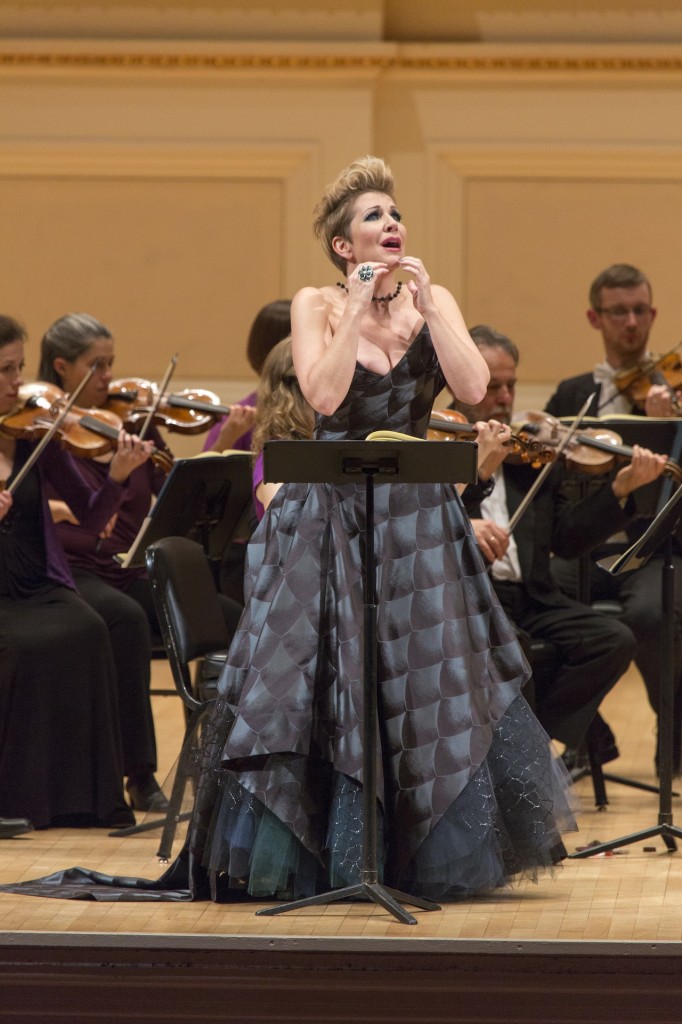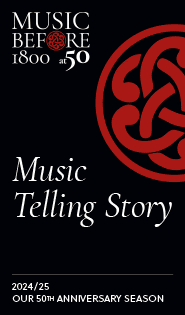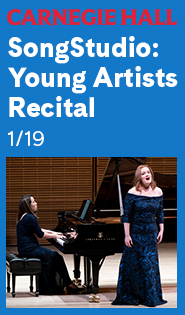A luminous DiDonato leads superb cast in Handel’s “Alcina” at Carnegie
Joyce DiDonato is the most incandescent singer on today’s classical music scene, and on Sunday afternoon, even Carnegie Hall didn’t seem large enough to contain her voice and expressive presence.
The American mezzo-soprano sang the title role in a concert performance of Handel’s opera Alcina, accompanied by the English Concert and conductor Harry Bicket. The concert was part of DiDonato’s Perspectives Series this season at Carnegie, in which she will be appearing again in recital, and singing chamber and orchestral music. Yet, as spectacular as she was, the concert was no mere star vehicle: DiDonato was matched by a deep cast and superb musicianship, making for an exhilarating, memorable afternoon. With all the applause between numbers, the performance ran 45 minutes overtime and no one minded a bit.
Alcina is one of Handel’s greatest scores. Dramatically, it’s a unusual combination of sex comedy and heartbreak, an opera buffa/seria hybrid. The story was adapted by Antonio Marchi from Ariosto’s Orlando furioso for the English stage at a time when Italianate opera was the craze. Alcina is a sorceress who has captured many men and transformed some into beasts—and, as the beautiful concluding phrases go, “waves” and “boughs”—and captivated others, including the knight Ruggiero. Ruggiero’s fiancé, Bradamante, lands on the island with her tutor, Melisso, in search of her betrothed, and misunderstandings, love-triangles, cross-dressing and real passion ensue.
The cast of characters also includes Oberto, a boy in search of his father, and Oronte, Alcina’s general, and himself in love with the sorceress’ daughter, Morgana. Morgana finds herself smitten with Bradamante, who is passing herself off as a knight named Ricciardo.
In the absence of staging, the male singers wore tuxedoes, the women in trouser roles wore, well, trousers, mezzo-soprano Christine Rice, as Bradamante/Ricciardo wore a long frock over pants, while Morgana—soprano Anna Christy—and Alcina wore gowns, DiDonato’s an impressive and stylish number that ably conveyed the characters’ power.
She could have done that in a t-shirt, though. Although a very different singer, DiDonato has comparable immediacy and intimate intensity to her expression as the late, great Lorraine Hunt Lieberson. Every mood and dynamic seems addressed directly to the listener, with no dramatic barrier. The rich sound and incredible power of her voice are apparent, and underneath is a level of intensity of thought and feeling that is rare for any performing artist, in any field. Even at low volume, and in introverted passages, this intensity gives every note she sings tremendous musical and expressive volume. She can also go from flickering candle to flamethrower in the breadth of a note, always focussed and under control.
Handel is ideal for her artistry, and she has already recorded some arias, and sung this role with Alan Curtis and Il Complesso Barocco, on the Archiv label. Handel’s music expresses thoughts and moods by defining them through musical logic—the shape of a phrase, harmonic movement, rhythmic sharpness. It demands superior articulation, timing and breath control—which she has—and rewards by reaching points of considerable and conjoined musical and emotional power.
For Alcina in particular, the composer mixes unusually broad intervals and unexpected modulations to show the characters wild mix of tenderness and fury, as in the recitative and aria that closes Act II, “Ah! Ruggiero crudel” and “Ombre pallide.” DiDonato was astonishingly commanding.
Although the force of her voice and musical personality are unique, she in no way overshadowed her colleagues. Handel wrote great music for all the characters, everyone has the chance to show the quality of their voice and their thinking. Christy was silvery, vivacious and flirtatious, Rice sang with beauty and expressive power. As Ruggiero, mezzo-soprano Alice Coote drew as much rapturous applause from the audience as DiDonato. Her legato phrasing was poised, elegant and deeply affecting, as in her Act II aria “Mi lusinga il dolce affetto,” when the character struggles to escape from his enchantment.
Even the small role of Oberto, soprano Anna Devin, comes to the fore, with the Act III aria “Barbara!,” when the character confronts Alcina. Devin was volcanic. Bass Wojtek Gierlach and tenor Ben Johnson, as Melisso and Oronte respectively, are there for dramatic support and a few comic moments, both sang strongly. Johnson shined with a lively “Semplicetto!” The entire cast sang with such a full sense of characterization that one never missed costumes and sets.
But this is an opera for the women to shine. At the climax, Handel wrote a superb number for the three mezzo voices, “Non è amor, né gelosia,” mixing the principal characters with astonishing skill and clarity. Bicket, leading from the keyboard, trimmed some of the full ensemble pieces from the performance, but the resolution of “Dall’orror,” with everyone singing, was plangent with pathos and satisfaction.
The English Concert’s accompaniment was exceptionally refined, stylish, and, given the lush vocal writing, effectively understated. The orchestra produced multiple colors, from the pickled-brine of the double-reeds, to the hollow silver of the recorders and the warm silk of the strings. Principle cellist Joseph Crouch was a star, with a deeply expressive obligato to Alcina’s breathtaking “Si, son quella,” and a beautiful, concise improvised solo following Morgana’s Act III aria, “Credete al mio dolore,” its tune adapted from Bach’s Ich habe genug. The consistent exactitude of the orchestra’s intonation was marvelous.
Joyce DiDonato’s Perspectives Series continues 8 p.m. November 4m with a recital titled “A Journey Through Venice” carnegiehall.org



Posted Oct 27, 2014 at 7:54 pm by CastaDiva
Excellent review of a superb performance. Absolutely unforgettable.